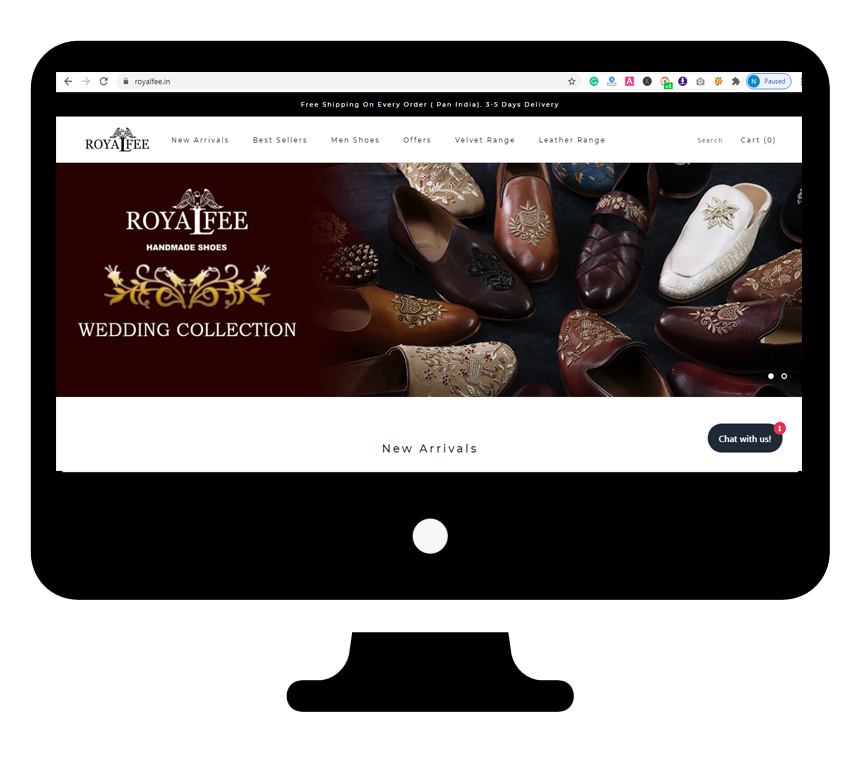Social Media Marketing for Ecommerce – Get more sales of eCommerce Websites through Social Media Marketing.
At Social Geeks, our social media team has years of experience creating effective campaigns for ecommerce retailers, and we’d love to do the same for you.
We are now in the e-commerce websites marketing optimization era. To improve growth, businesses need to innovate their approach to online business advertising..
Get in touch with us today for more information and a Get free ecommerce social media proposal!
Social Media Marketing for Ecommerce Websites
Speak to our expert 9915337448
Ecommerce social media is the act of using social media to market an eCommerce store. Ecommerce stores can use social media to build brand awareness and get real results.
Ecommerce sales are expected to hike up to $476 billion by 2024. Then again, the figure could be higher as the 2020 eCommerce explosion has seen the sales rise to $374 billion.
With such marketing, eCommerce stores must work harder to stand out from the crowd, which calls for unique and effective eCommerce marketing strategies.
Consider Everything…In a single minute, customers are accessing discount codes on apps, following influencers on social platforms, clicking on Facebook ads, Instagram ads, reading promotional emails, comparing shopping marketplaces, spending billions online, and more.
To capture the customer’s attention, therefore, marketers should take note of eCommerce marketing trends and strategies that, besides gaining traction, are proven to lift sales for businesses.
Top Ecommerce Trends 2020-21:
- Online Sales Growth is Unstoppable
- The Future of Ecommerce After COVID-19
- Mobile Shopping is Growing
- Rise of Voice Commerce
- Evolving Role of Social Media in Ecommerce
- Environmental Topics Influence Buyers
- Role of Artificial Intelligence
- Augmented Reality Transforms How We Shop
- Personalization is the Future
- Visual Commerce Is on the Rise
Ecommerce Marketing in 2021
The internet provides marketers with a myriad of effective means of connecting with prospective and existing customers. For instance, high-quality and informative content can lead to brand loyalty by helping customers make informed purchase decisions.
Here’s an in-depth overview of some effective eCommerce marketing strategies for 2021 and beyond.
Content Marketing
Content is King – from funny banners, GIFs on mind-blowing articles and thought-proactive webinars. As such, consumers spend over a third of their day engaging with digital content on multiple devices.
So how do you use content to your advantage?
Content marketing involves creating digital materials (e.g., videos, blog posts, GIFs, etc.) that attract, convert, and retain the target audience. This strategy educates potential customers about your services/products while establishing your brand as a thought leader in a given subject.
Applying Content Marketing to Your Ecommerce Business
Search engines love content. In fact, content is among the top three ranking factors on Google. Thus, creating quality content with a high search demand will –
i. send traffic to your site, and ii. Generate lead and demand for your products.
To do so, always focus keywords with high search volumes and develop content around them. Note, the term “high volume” is relative – while 1000 searches/month may be worthwhile to some people, others consider such figures to be worthless.
Here, think of phrases that describe your products. Next, utilize keyword analysis tools such as Ahrefs, SEMrush, Ubbersuggest, and others to generate content ideas, determine the keyword difficulty, and keyword popularity/search volume.
Pay-Per-Click Advertising (PPC)
Pay-per-Click advertising or PPC can be one of the foundational elements in your ecommerce marketing strategy.
Just in case you’re unfamiliar with PPC, your brand would pay an ad network, like Google, every time someone clicks on your advertisement.
Of course, there are several types of PPC advertisements that I’d like call attention to – paid search, display, and shopping campaigns – since they’re most relevant to ecommerce marketing success.
Each type of PPC advertising can play an important, yet different role in your overall marketing strategy.
Search Engine Optimization (SEO)
Over the past years, Search Engine Optimization has evolved for the better.
In the past, SEO experts using ethical tactics and exploits to boost website rankings over the Google.
Now, on the other hand, SEO is more about adhering to on-site best practices and improve your ranking, rather than “working the system.”
That being said, SEO is a growth marketing strategy should NOT be overlooked.
In fact, 80-90% of Google users are only focusing on the organic search results.
These social media strategies should aid in developing healthy patterns of online engagement:
Social Media Marketing (SMM)
Social media is paramount for e-commerce; its significance has grown to mammoth proportions over the years with its ability to reach specialized pools of consumers.
Brands that relied on traditional forms of advertising to further their base have taken to optimizing their brand to fit into different social media niches on the web. E-commerce brands can target consumer collectives with a range of purchasing capacities through planned social media strategies.
Choosing the right Social Media Platforms
Based on the core of the business, goals and user base – the platform should be chosen. Each platform has a different set of users with different purposes. The leading social networks along with its latest features used by businesses are listed below.
Have a look at our eCommerce Websites Portfolio:


Here’s how to get started with four of best social media platforms for ecommerce:
Facebook Marketing
Methods to leverage Facebook to boost your business
❖ Facebook business page: The first step in Facebook marketing is creating a facebook business page. This is the place where you showcase your business, add products, receive customer reviews, get engagements on your products or posts.
But the facebook business page has certain limitations.
- The organic reach of any Facebook business page post will be limited to the followers of your page.
- Even among your list of followers, your posts will be reaching to limited followers.
Hence, paid advertising is the way forward for you to showcase your business to the large audience (targeted audience).
❖ Facebook pixel: It is a piece of code provided by Facebook which can be used on your website. This code will allow you to measure the effectiveness of ads by understanding the action of visitors on your website.
Here is the step-by-step guide from facebook on creating and installing facebook pixel on your website.
Once you are done with pixel setup, start Facebook advertising for your business.
Few tips for running Facebook ads for product:
- Conversion should be the only objective.
- Dynamic ads, Facebook Carousel ads and retargeting ads work better.
❖ Dynamic Product Ads – It is also said to be the highest ROI method for e-commerce business. However, you should have Facebook Shop for this feature to work.
❖ Facebook Carousel Ads – This feature allows you to display up to 10 images or videos in “cards” format in a single ad. Using this feature can give more options to your customers and can also show different features of the same product. Carousel ads have higher interaction rates.
❖ Retargeting Campaigns – We saw how Facebook pixel understands user behaviour on your website. And, some visitors might leave your website without making any appropriate actions due to various reasons such as distractions, poor internet connectivity and so on. You can target the visitors who left midway and bring them back using retargeting campaigns.
❖ Facebook Shop – It is the place where you can sell products using your Facebook page as well as Instagram Shopping catalog.
Instagram Marketing
Instagram is the current hottest sensation among all the social media networks. Once you create an Instagram account make sure you change that into a business account. Furthermore, make sure that your product catalog is synced with Facebook Shop.
Methods to leverage Instagram to boost your business
❖ Influencer Marketing – According to Bloglovin, Instagram is the most effective platform for engaging with the target audience.
Users (influencers) with huge followers ranging from thousands to millions can be considered as Instagram Influencers.
Why Instagram influencer marketing?
In simple words, Instagram has
-Massive Reach
-High Engagement Rate and
-Influencers’ Choice
A comprehensive guide to Instagram influencer marketing by Convince & Convert has a detailed guide to Instagram influencer Marketing. You can check it out.
❖ Strategic use of Hashtags – Use hashtags that are relevant to the particular post and its intention. You can also add hashtags that represent your brand.
❖ User-Generated Content – People trust other people, sometimes more than brands. So it is recommended to post user-generated content, this also improves the brand awareness and engagement.
❖ Use Stories – Stories are a better way to reach out to your customers. While your post could be lost in their feed; stories have better chances of reaching them.
❖ Use Videos – Instagram is not just about pictures anymore. With the release of IGTV, it is obvious that Instagram wants enterprises to leverage storytelling in video format.
❖ Photos with right sizes and same patterns/filters – Businesses have a common background to which they add their content; the common background includes – logos, frames and many more. Filters can make the photos appear better. Using the same background or style might help customers to recognize the brand easily.
Benefits of Social Media Marketing for eCommerce
The most talked about benefits of social media for ecommerce include:
- Increase your online reach
Considering 71% of adults with Internet access use social media, almost every business can benefit from marketing on platforms like Facebook, Twitter, and Instagram. This is especially true for ecommerce retailers.
- Reach your target audience where they spend the most time
Optimizing your site for search engines and running PPC campaigns allows you reach users while they’re actively searching for specific products, but with social media, you can also reach them on their favorite places online.
- Engage your target audience in a casual way
Social media platforms also offer a much less formal way of communicating with potential customers than any other advertising channel, making it easy to engage in two-way conversations with users who are interested in learning more about your products.
- Help your brand get shared online
Given the nature of social media, it allows your current customers to share your brand with their family and friends — an ideal situation for any online retailer.


